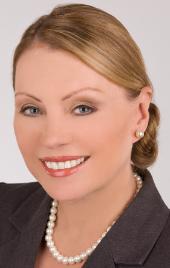Despite death threats, lecturer in favour of taking bull by horns
Published on 11 July, 2011
CQUniversity Economics lecturer Patricia Petersen knew what she was getting in for when she agreed to organise the recent 'National Day of Action to End Live Exports' across more than 150 Australian towns and cities...
Having run as a political candidate on a couple of occasions, she has previously dealt with threating phone calls, emails and text messages. She has also been involved in the live export issue on previous occasions and knew its potential to be divisive.

Lecturer Patricia Petersen encourages academics to lead debate in the community
Patricia started an Animal Welfare Society when she was a student at the University of Queensland in the 1990s and later, as a political candidate, she took up the concerns of meatworkers losing jobs due to the live export trade.
These related issues became even more stark this year thanks to ABC TV's airing of footage from Indonesia slaughterhouses and Patricia was motivated to organise speakers for rallies across the nation.
Patricia is now organising another National Day of Action to End Live Export on July 30
with details available via this LINK
Previous experience dealing with the media came in handy, including commentary spots on metropolitan radio and a role as a panellist on the Beauty and the Beast TV show.
Patricia says she knew she would be criticised and it was no surprise when she bore the brunt of hate messages from live export supporters.
Despite this, she urges academics to "seize the chance" to get involved as commentators on controversial issues.
"Often governments can and should be influenced by academics who live and beathe these specialty areas and talk to each other about them, to help make sense of complex issues," she says.
"It's good for the profile of the universities for academics to take an active role in these debates."
Patricia says the live exports issue cuts across her interest as an economist and her interest as someone concerned about animal welfare, but she was certainly not a life-long vegetarian.
"At the time of the protests I was still eating meat and though I've now stopped eating meat I'm not a vegetarian," she says.
"As an economist I can see that sending cattle on long journeys is not an efficient use of fuel and grazing cattle in the sensitive Top End is not going to help the environment either. I can see the economic effect of 40,000 meatworker jobs being lost over the past five years."

